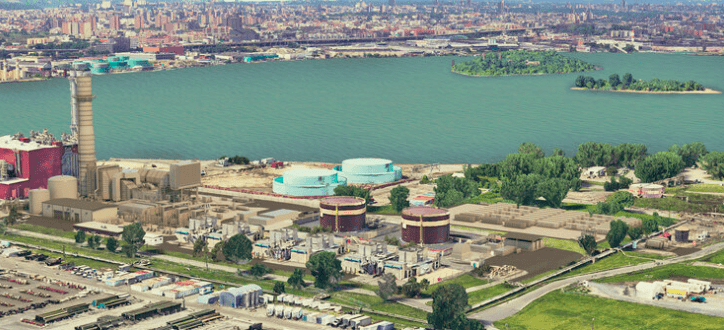
New York officials have denied permits for NRG Energy’s proposed natural gas-fired power plant upgrade project in Astoria, a decision made after an environmental agency said the plan was “inconsistent” with a state measure to reduce greenhouse gas emissions.
The state’s Dept. of Environmental Conservation (DEC) on Oct. 27 said the proposed new power plant “would be inconsistent with or would interfere with the statewide greenhouse gas emissions limits established in the Climate Leadership and Community Protection Act (CLCPA).”
DEC’s determination stated, “Astoria NRG failed to demonstrate the need or justification for the proposed project notwithstanding this inconsistency.” Wednesday’s ruling came after the DEC in July approved draft permits for the Astoria Replacement Project, a 437-MW plant that would have replaced half-century-old gas-fired units in the Ditmars-Steinway area of Queens County in New York.
The DEC’s reversal came after a series of public hearings this summer in which the agency received more than 6,000 responses in opposition to the project.
Lawmakers in Opposition
New York Gov. Kathy Hochul in a statement said she supported the DEC’s decision to deny the Title V air permits needed for the proposed plant to move forward. “Climate change is the greatest challenge of our time, and we owe it to future generations to meet our nation-leading climate and emissions reduction goals,” Hochul said.
Several state and local lawmakers opposed the project, citing the potential violations to the CLCPA. The act calls for an 85% reduction in greenhouse gas emissions by 2050, 100% zero-emission electricity by 2040, and 70% renewable energy by 2030.
Tom Atkins, vice president of development at NRG, in a statement said, “NRG is reviewing the state’s decision, but it’s unfortunate that New York is turning down an opportunity to dramatically reduce pollution and strengthen reliable power for millions of New Yorkers at such a critical time. NRG’s Astoria Replacement Project would have provided immediate reductions in greenhouse gas emissions and would have been fully convertible to green hydrogen in the future.
“New Yorkers deserve both cleaner air and reliable energy to ensure the lights stay on for our small businesses, homes, schools and hospitals when they need it most,” Atkins said. “While we’re deeply disappointed with this decision, NRG will continue to find ways to help New York achieve its emissions goals. In the meantime, our current Astoria plant will continue to operate to help ensure the lights stay on in New York City, as that remains the most important thing.”
Atkins said upgrading the Astoria plant would have significantly reduced the carbon footprint at the site. NRG had estimated the new plant, with its advanced technology, would have reduced statewide greenhouse gas emissions by more than five million tons through 2035. The utility also has said that given current technology, New York City cannot be powered by renewable energy resources alone, but needs a combination of natural gas and renewables.
After the DEC approved draft permits for the Astoria project in July, it also said it would open a public comment period, with DEC Commissioner Basil Seggos saying via Twitter, “DEC found that the current applications haven’t justified the projects or shown compliance with NY’s climate law.” Environmental groups, led by the No Astoria NRG Plant Coalition, a group that includes NYC DSA, Food & Water Watch, Sane Energy Project, Queens Climate Project, NYPIRG, Sierra Club, New York Communities for Change and 350Brooklyn, in a statement at that time said they were “heartened to see the DEC question how a dirty fracked gas power plant can comply with state climate law.”
“It’s a sign that the people-led movement against new fossil fuel infrastructure here in New York City and across the state is winning,” the group said in the July statement. “We are seeing the devastating consequences of climate change today, and any new fracked gas project being proposed or approved in 2021, when we have viable alternatives… is a dangerous exercise in climate denial.”
Facility Would Function as Peaker Plant
The proposed peaker plant, sited on 15 acres within a 300-acre Consolidated Edison (Con Ed) complex, would have been used to supplement the New York City power grid during periods of high demand for electricity. NRG had argued that while the plant was designed to run on natural gas, it would have the capacity to run on hydrogen as a cleaner alternative.
Queens Borough President Donovan Richards in a statement said the DEC decision sends a message that the plant is “antithetical to our critically important mission to eliminate our city’s dependence on fossil fuels. From Superstorm Sandy to Hurricane Ida, Queens knows all too well the catastrophic impacts climate change has had on our borough. Time is of the essence, and today’s decision ensures Queens will continue to be a global leader in the fight for a more sustainable, resilient and healthy environment.”
New York Democratic Sen. Chuck Schumer was among the lawmakers who opposed the plant. Schumer in a statement Wednesday said, “A rebuilt NRG plant would have kept a fossil fuel-dependent power plant in Astoria for years to come, directly undermining the urgently needed goals laid out in New York’s groundbreaking climate law, the Climate Leadership and Community Protection Act—a law I was proud to champion. I am so proud to have fought alongside great local leaders and activists to stop this pollution-spewing plant.”
NRG acquired the Astoria Gas Turbines site from Con Ed in 1999. The larger Con Ed complex has hosted electrical generation, transmission, distribution and associated energy activities since the 1890s. The Astoria site when acquired by NRG had 33 gas turbine units, with total generating capacity of 646 MW. The Astoria Replacement Project called for replacing the 24 remaining gas-fired units at the site with a single new state-of-the-art simple cycle GE combustion turbine generator.
—Darrell Proctor is a senior associate editor for POWER (@POWERmagazine).
The post New York Officials Deny Permits for Proposed NRG Gas-Fired Plant appeared first on POWER Magazine.